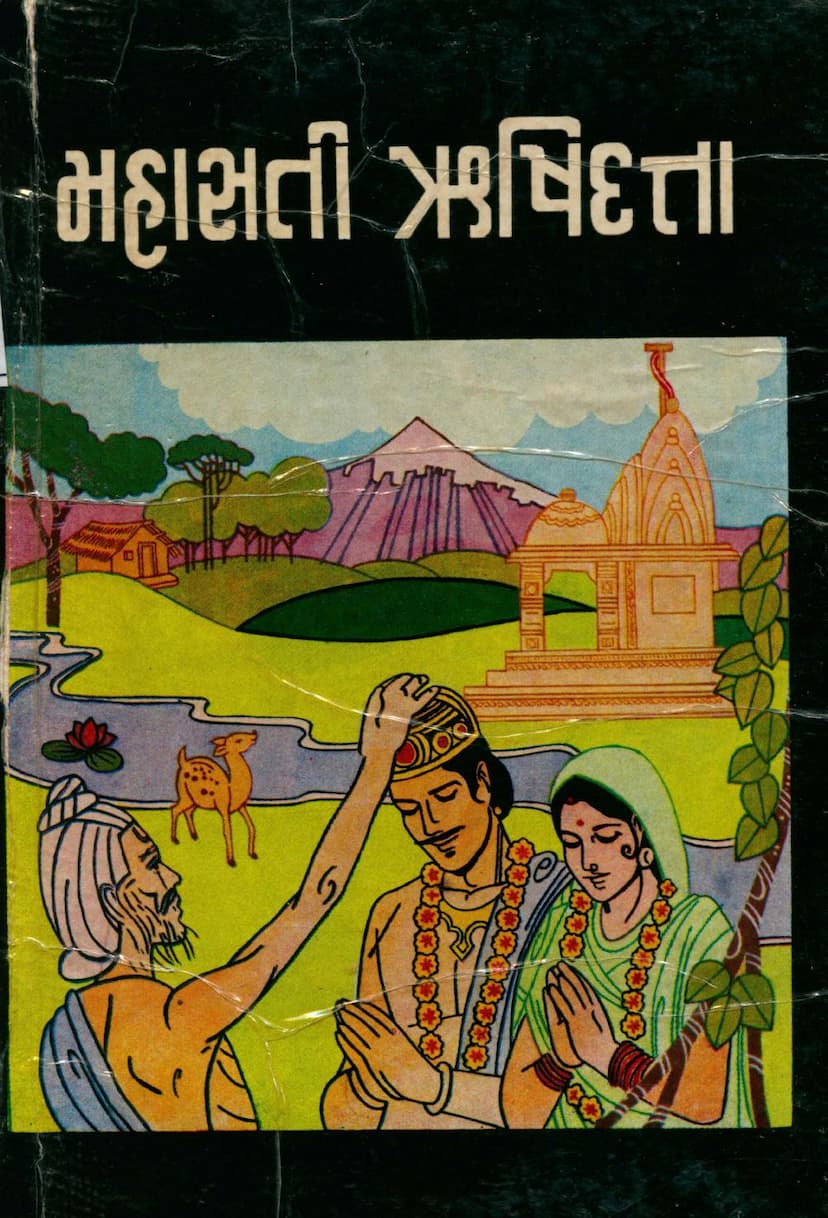Mahasati Rushidatta
Added to library: September 2, 2025

Summary
Here's a comprehensive summary of the Jain text "Maha sati Rushidatta," based on the provided pages:
Book Title: Mahasati Rushidatta (Part 1) Author: Acharya Devshri Vijay Bhuvanbhanusuri Maharaj Publisher: Divyadarshan Trust Catalog Link: https://jainqq.org/explore/022898/1
Overall Theme:
The book, "Maha sati Rushidatta," is a collection of discourses by Acharya Vijay Bhuvanbhanusuri Maharaj, compiled and presented by the Divyadarshan Trust. It aims to illuminate the life and teachings of Maha Sati Rushidatta, presenting her story not as mere entertainment, but as a profound religious discourse offering inspiration for living a life of chastity (Shil), patience, and courage. The book emphasizes the timeless value of pure conduct in Jainism and Indian culture, contrasting it with the perceived decline in character in contemporary society. It aims to guide readers towards spiritual progress and self-realization through the contemplation of Rushidatta's life.
Key Content and Themes:
- Focus on Chastity (Shil): The text consistently highlights the supreme importance of chastity and righteous conduct, drawing parallels with other revered Jain and Indian female saints. It posits that pure character is the most valuable jewel of human life, an adornment of inner beauty, and the lifeblood of social and spiritual existence.
- Inspirational Life of Rushidatta: The book presents Rushidatta's life as a testament to these virtues, particularly her resilience in the face of severe adversity and life-threatening challenges for the sake of protecting her chastity.
- Storyline of Rushidatta (as outlined in the summary):
- The narrative begins with Prince Kankarath of Thaman, who is sent by his father to marry Princess Rukmini of Koveri.
- On his journey, Kankarath encounters a beautiful maiden named Rushidatta, the daughter of a sage (tapas). Despite his initial lack of attraction, he is compelled by the sage to marry Rushidatta.
- The marriage leads to complications, as Rukmini, upon learning of Kankarath's departure with Rushidatta, orchestrates a plan to frame Rushidatta.
- She hires a sorceress named Susa, who, through magical means, creates a gruesome scene around Rushidatta's face each night, making it appear as though she is consuming human flesh.
- This leads Kankarath to believe Rushidatta is a witch.
- The King (Rukmini's father) is convinced by Susa that Rushidatta is responsible for these nightly occurrences and orders her execution by being paraded through the city and then killed.
- Rushidatta is thrown off a cliff, believed to be dead, after which her challenging life begins.
- The summary explicitly states that this is the content of the first volume, with the continuation to be presented in the second.
- Philosophical and Ethical Teachings: Beyond the narrative, the discourses delve into philosophical concepts such as:
- The Importance of the Soul (Atma): The text emphasizes prioritizing the soul's well-being over materialistic pursuits.
- The Law of Karma: The book discusses how actions (karma) influence one's destiny and the cyclical nature of birth and death.
- The Power of Faith, Discernment, and Action (Shraddha, Vivek, Kriya): These are presented as the pillars of a true follower (Shravak).
- The Value of True Knowledge (Shrut): The importance of studying scriptures and applying their wisdom to develop a refined intellect (Buddhi-atishay) is stressed.
- The Nature of Desire and Attachment: The text critiques the excessive pursuit of sensory pleasures and worldly possessions, highlighting how they lead to suffering and spiritual stagnation.
- The Role of Patience, Courage, and Equanimity: These virtues are portrayed as essential for overcoming life's challenges.
- The True Meaning of Devotion: It distinguishes between superficial rituals and genuine devotion rooted in understanding and following the teachings of the Tirthankaras.
- The Power of Words: The impact of speech is emphasized, highlighting how carefully chosen, virtuous words can have a transformative effect, while harsh or thoughtless words can cause irreparable damage.
- The Importance of Self-Reflection and Correcting One's Own Faults: The text encourages introspection rather than blaming external circumstances or other people for one's misfortunes.
- The Concept of "Nimit" (Means/Causes) in Karma: The book explores how external factors (like mantras or even timely events) can influence the manifestation of karmas, but the ultimate root lies in the karmic bonds themselves.
- The Value of a Human Birth: The text underscores the rarity and preciousness of a human birth, emphasizing the opportunity it provides for spiritual liberation.
- The Practice of Equanimity (Samata): Maintaining a balanced state of mind in both favorable and unfavorable circumstances is presented as a key to spiritual growth.
- The Danger of Vices: The discourses address the destructive nature of anger, greed, ego, and lust, and their detrimental impact on one's spiritual journey.
- Literary Style: The discourses are described as insightful, logical, and deeply philosophical. The language is intended to be accessible and engaging for the spiritual seeker.
Publication Details:
- First Edition: V.S. 2037 (corresponding to 1980 AD).
- Editor: P.P. Munirajshri Padmasenvijayji Maharaj.
- Sponsors: The publication was made possible through the generosity of Shri Bipimbhai Mayabhai Laxmichand.
- Publishing House: Divyadarshan Trust, Dunavada - Jhala, Mumbai.
- Contact Points: Various addresses in Ahmedabad and Mumbai are listed for obtaining the book.
Overall Impression:
"Maha sati Rushidatta" is presented as more than just a historical account; it's a guide for spiritual seekers. The discourses are designed to impart profound moral and philosophical lessons, drawing upon the life of Maha Sati Rushidatta to illustrate the path to righteousness, spiritual strength, and ultimately, liberation. The detailed chapter index reveals a broad range of topics covered, from princely journeys and encounters with sages to intricate discussions on karma, the nature of the soul, and the path to spiritual awakening.